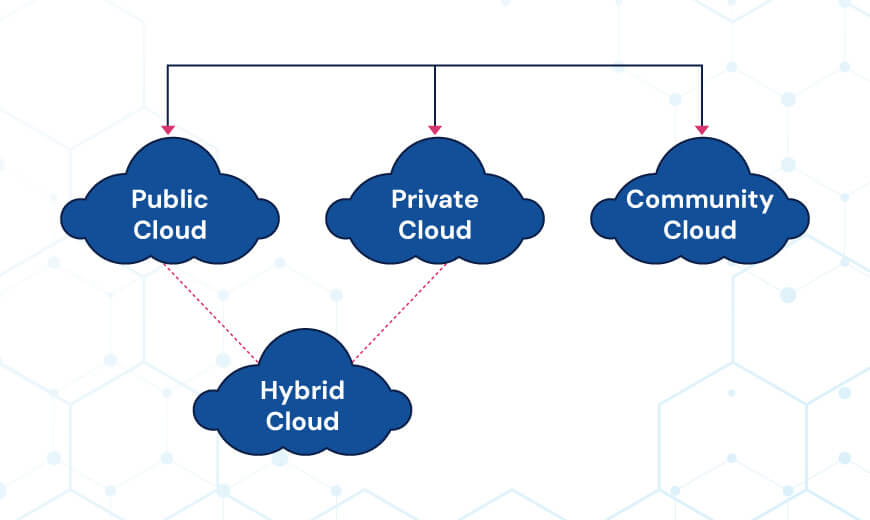The ‘cloud computing’ word came into existence when Amazon launched AWS in 2006. Now, It has become a lifeline for businesses wanting to take products or services online. Since they have different cloud computing needs, cloud deployment models are introduced to fulfil the diverse requirements of enterprises.
In this comprehensive blog, we will explore the top 4 cloud deployment models with their pros and cons. We will also learn about important factors to consider before planning to deploy a cloud model and how to choose the right one for your business.
Explore the four cloud deployment models to find the ideal fit for your business.
A] What is the Cloud Deployment Model?
The cloud deployment models are the segment of cloud computing that decides the authority, accessibility and data-storing capabilities. Access, location and controls determine the infrastructure of the cloud computing environment. It offers ownership and data-sharing control capabilities based on the nature of the deployment model. It also determines how cloud services are made available to users. Cloud deployment has four types, ie, public, private, community and hybrid and these four types are known to be 4 cloud deployment models.
B] Best 4 Cloud Deployment Models
1. Public Cloud Deployment Model
The public cloud deployment model is the most recognised and used model, offering cloud computing services for the public domain. It is a subscription-based model and the service provider owns the infrastructure and related control. The service provider handles the security, maintenance and management of the data centre. Hosting data on the public cloud is relatively quick and easy, offering a hassle-free environment for testing applications and growing businesses.
Advantages of Public Cloud Deployment Model
- Low Expenditure: Public cloud computing is renowned for its low-cost setup. It allows users to pay as per service. It offers approximately zero maintenance cost, making it one of the low-cost cloud deployment models.
- Scalability: Whether you are running out of storage or want to extend user handling capacity, the public cloud is renowned for offering almost unlimited scalability with on-demand resources.
- Support: It provides a robust support system to counter technical glitches or specific cloud service issues over email or phone calls.
- Maximum Uptime: The robust and highly-maintained infrastructure provides maximum uptime to ensure your business never goes offline.
Drawbacks of the Public Cloud Deployment Model
- Security Concerns: Since services are accessible to the public domain, public clouds are more prone to cyber-attacks and data theft. The public cloud deployment model is relatively less secure than other cloud models.
- Lack of Controls: The service provider owns control over the public servers. There is a high chance of data duplication and theft as your data is stored outside of your reach.
- Less Reliable: As your data is stored on the service provider’s infrastructure, it poses reliability and data security concerns.
2. Private Cloud Deployment Model
The private cloud development model is a type of cloud deployment model that is fully owned and managed by the business or tenant. It is renowned for providing robust security and performance using dedicated hardware infrastructure. It offers high reliability, extreme customisation and faster speed. However, businesses can choose to build their own private cloud deployment within their premises or they can rent private cloud infrastructure from a renowned dedicated cloud service provider. Since assembling an on-premises private cloud server demands a lot of investment due to expensive hardware and setup costs, renting private cloud infrastructure would save a lot of money.
Advantages of Private Cloud Deployment Model
- Faster Loading Speed: The dedicated resources offer sole bandwidth to your website or application, leading to a faster loading speed and thus growing business.
- Security: Private cloud servers are known for their robust security protocols as they are backed with high-end firewalls, lowering the risk of cyber attacks, data breaches and leaks.
- Scalability: Businesses can extend their storage or resource needs as per requirement, offering a highly scalable solution for growing and established businesses.
- Uptime: It offers nearly 100% of uptime due to dedicated resources. A private cloud server can be a game-changer for a business that generates leads through its website or application. Nearly 100% uptime ensures your business’s website or application never goes offline.
- Value For Money: The sole resources, robust security, high scalability and faster loading make private cloud servers, a highly value-for-money deployment model.
Drawbacks of the Private Cloud Deployment Model
- Relatively Higher Initial Investment: Private cloud server demands relatively high initial costs. However, high-end features and robust security protocols could benefit enterprises in the long run.
3. Community Cloud Deployment Model
The community cloud deployment model is a shared infrastructure accessed by a group of organisations. The community cloud model offers access to resources within the shared interest of businesses, organisations or institutions. It is usually managed by a third-party community cloud service provider or by the user of community cloud resources. However, they use enterprise cloud backup solutions, in case they want to store any data beside the community cloud server. Community cloud deployment models examples are government cloud, health cloud and education cloud.
Advantages of Community Cloud Deployment Model
- Cost Effective: The total cost is divided between the organisations due to shared resources, making it a cost-effective option for shared-interest organisations or institutions.
- Data Sharing: It offers data sharing and collaboration among organisations, fostering informed and quick action.
Drawbacks of the Community Cloud Deployment Model
- Limited Customisation: Since resources are shared between the organisations, it reduces the possibility of customisation. If it does, it may hamper other institutional workflow.
- Security Concerns: The shared resources raise security concerns and make community cloud servers a soft target for cyber-attacks, data leaks or theft.
4. Hybrid Cloud Deployment Model
A hybrid cloud deployment model is built using the combination of public and private cloud resources infrastructure. It facilitates the seamless integration of both deployment models into one’s business to boost flexibility and optimal resource utilisation. For example, Walmart uses a hybrid cloud deployment model to manage its e-commerce platform. The public deployment model handles its application and fluctuating user loads while the private cloud manages sensitive customer data and internal applications.
Advantages of Hybrid Cloud Deployment Model
- Security: As sensitive data is usually stored in the private cloud model, the risk of a data breach is rare.
- Flexibility: It offers extended flexibility due to the private and public cloud server combinations. Businesses with fluctuating demands are highly suitable for leveraging the benefits of a hybrid cloud deployment model.
Drawbacks of the Hybrid Cloud Deployment Model
- Difficult To Manage: The deployment complexity makes it hard to manage deployment models.
- Complex Set-Ups: It possesses a complex set-up process and may need a skilful IT team to configure them.
C] What Are The Four Important Factors Of Planning Cloud Deployment?
1. Security
Security should be the primary concern before planning to deploy a cloud model. Deploying sensitive data over the relatively less secure cloud model may cause a data breach. The sensitive data leakage hampers the business reputation that’s why choosing a highly secured and reliable cloud deployment model is essential.
2. Performance
Performance is another factor to consider before planning to deploy cloud models. Different cloud models offer different performance capabilities. A high-performance cloud deployment model such as a private cloud would be the best fit for a high user base business with their sensitive data. A private cloud is a secured internet infrastructure that provides robust security and reliability.
3. Integration
The smooth integration of your critical applications or web services showcases the effectiveness of that cloud deployment model. Choose those models that take your services online without creating any integration issues. However, choosing a good cloud provider is crucial to resolving backend or integration issues effectively.
4. Legal
Cognizant of legal and regulatory compliance is crucial to successful deployment and leveraging uninterrupted cloud services. Businesses should clearly define data ownership, access rights and responsibilities during data breaches or service disruptions.
D] Choosing The Right Cloud Deployment Model
1. Business Needs and Goals
Assess business needs and specific requirements and choose a cloud deployment model as per your assessment. The private cloud deployment model is the best fit for businesses seeking enhanced security protocols and high-performing cloud deployment models.
2. Data Sensitivity
Assess your business’s data sensitivity level and opt for a model that offers robust security compliances. To provide optimal security for your sensitive data, a private cloud model would be the best fit.
3. Budget
Budget can be a crucial factor to consider before choosing the right deployment model. Public clouds often offer lower upfront costs, while private clouds may require higher initial investments but provide robust safety and optimal performance.
Explore the four cloud deployment models to find the ideal fit for your business.
Conclusion
Cloud deployment models are robust and efficient solutions for businesses wanting to take their products and services online. However, choosing the best cloud deployment models depends on the requirements of the business. It requires a thorough assessment and specific goals. Choose a deployment model that complies with your goal and needs and don’t forget about security while selecting any of them.
Absolute Cloud is a leading and renowned cloud service provider company that offers cost-effective and highly secured solutions to all your dedicated cloud computing needs. Contact us today!
FAQs for Cloud Deployment Models

Mr. Sachit Saraf
Director of Absolute Cloud and a second-generation leader in cloud computing, Sachit excels at merging technology with business acumen. With expertise in data analytics, business intelligence, and cloud solutions, he is committed to providing secure, 24/7 online access to critical software. Sachit’s passion lies in leveraging analytics for data-driven decisions, optimising processes, and driving transformative growth in the tech industry.


